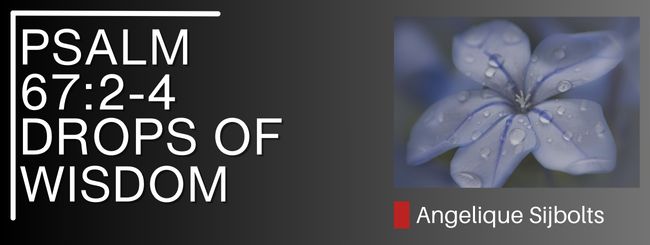27 Cheswan 5784, 11 November 2023
בס”ד
Introduction
As we delve into the timeless verses of Psalm 67:2-4, we embark on a spiritual journey that navigates the intricate connection between divine favor, the symbolism of rain, and the profound teachings of the Torah. This sacred text invites us to contemplate the nuanced interplay of G-d’s blessings, the life-giving nature of knowledge, and the universal recognition of His benevolence. Join us as we explore the rich layers of meaning embedded in these verses, drawing inspiration from both the poetic imagery and the insightful commentary of Rashi.
Drops of Wisdom
In the second verse, the psalmist invokes a prayer for Divine favor and blessing, imploring G-d to illuminate His countenance upon us.
אֱֽלֹק֗ים יְחׇנֵּ֥נוּ וִיבָרְכֵ֑נוּ יָ֤אֵֽר פָּנָ֖יו אִתָּ֣נוּ סֶֽלָה׃
May G-d favor us and bless us, may He illuminate His countenance with us, Selah.
Rashi’s commentary on this verse emphasizes the significance of G-d’s shining countenance, bringing forth dew and rain. Rain, portrayed as a Divine blessing, is crucial for sustaining life, providing both nourishment and growth. It surpasses even the resurrection of the dead, symbolizing G-d’s impartial benevolence upon the righteous and the wicked alike.
The Torah, often likened to living water, is a parallel theme. Deuteronomy 32:2 echoes this connection, stating,
“My teaching shall drop like rain, and there is no teaching besides the Torah.”
Rava further reinforces this analogy by linking rain to the Torah.(Taanit 7a)
In the Amidah/Shemoneh Esrei, we find the following request:
חָנֵּֽנוּ מֵאִתְּ֒ךָ דֵּעָה בִּינָה וְהַשְׂכֵּל
“Favor us/grant us from Yourself knowledge.”
This plea for knowledge acknowledges that knowledge, particularly that imparted through the Torah, is not created but shared. This request seeks direct enlightenment from G-d, recognizing the intimate connection between the Giver and the receiver of knowledge.
Moving to the third verse,
לָדַ֣עַת בָּאָ֣רֶץ דַּרְכֶּ֑ךָ בְּכׇל־גּ֝וֹיִ֗ם יְשׁוּעָתֶֽךָ׃
To make known Your way on earth, among alle nations Your salvation.
the psalmist expresses a desire for G-d’s way to be known on earth, spreading His salvation among all nations. The Torah, given to Israel, becomes the means through which G-d is understood. As people grasp more of G-d’s character, a continuous expansion of understanding unfolds, resembling an ever-expanding ripple effect.
The nations, in this growing awareness, will recognize G-d’s faithfulness to His people. They will discover that G-d’s actions consistently benefit His chosen ones, providing an example for the godfearing among the nations. Rashi on vers 4 emphasizes that revealing G-d’s trait of benefiting His people will lead to rejoicing and praise among the kingdoms.
The acknowledgment of G-d by all peoples, as stated in verse 4,
יוֹד֖וּךָ עַמִּ֥ים| אֱלֹקים י֝וֹד֗וּךָ עַמִּ֥ים כֻּלָּֽם׃
The peoples will acknowledge You, o G-d; the peoples will acknowledge You – all of them.
serves as the culmination of this prayer. The repetitive phrasing underscores the universality of this recognition – an acknowledgment extending to every nation. Together, these verses weave a narrative that encompasses divine favor, the parallel between rain and Torah, the plea for knowledge, and the global acknowledgment of God’s benevolence.
Conclusion
As we close our exploration of Psalm 67:2-4, we carry with us the profound wisdom embedded in these verses. The plea for divine favor, the metaphor of rain symbolizing G-d’s blessings, and the call for universal acknowledgment of His benevolence invite us to reflect on the deep interconnection of spirituality and life. May the lessons learned inspire a continued journey of spiritual growth and a heightened awareness of the divine in our lives.
By Angelique Sijbolts
Sources:
Texts from Sefaria.org
Shemoneh Esrei by Rabbi Ezra Bick
© Copyright, all rights reserved. If you enjoyed this article, we encourage you to distribute it further.
Our blogs may contain texts/ quotes or references of
Mechon-Mamre.org, Aish.com, Sefaria.org or AskNoah.org
that contain copyrights and which we may use with there permission.
